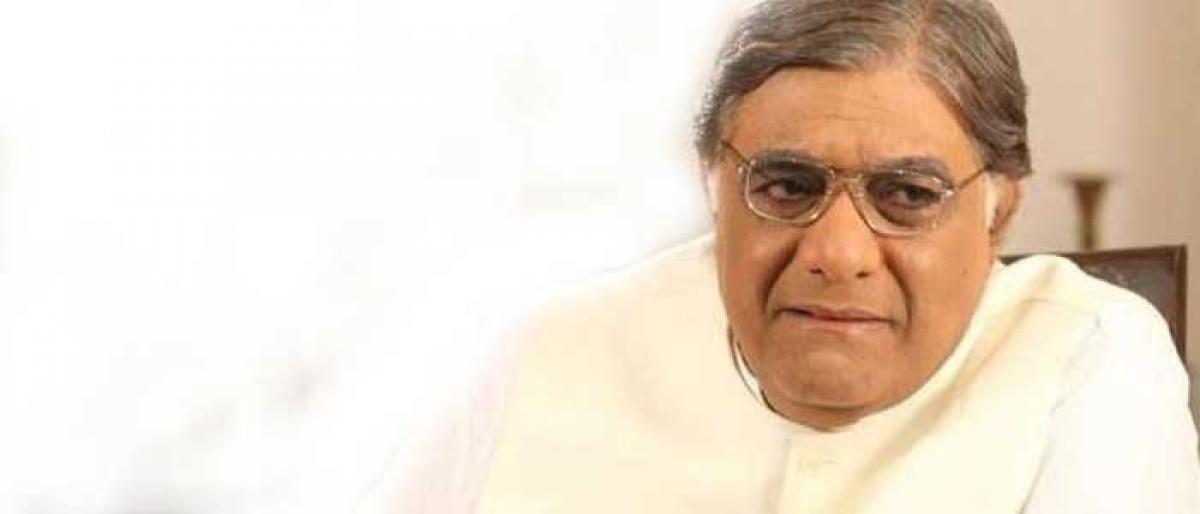Good theatre is a way of life

Aanjjan Srivastav, a well-known theatre, television and film actor was in Hyderabad for a performance on the invitation of Qadir Ali Baig Theatre Foundation. In a freewheeling chat, he spoke about the past and present Indian theatre scenario.
Aanjjan Srivastav, a well-known theatre, television and film actor was in Hyderabad for a performance on the invitation of Qadir Ali Baig Theatre Foundation. In a freewheeling chat, he spoke about the past and present Indian theatre scenario.
Excerpts:
How did you manage theatre along with your bank job?
As they say, ‘Where there is a will, there is a way’. I have worked in nearly three shifts on many occasions. Mornings I used to attend Law classes followed by the bank job and practice theatre in the evening. It’s not easy to take up any path in life. Any work is equally challenging in life. The spirit of continuing to do good work must never die.
How did theatre help you in your film career?
Theatre requires a lot of stamina. It is a place which gives you an opportunity for constant practice and creativity. One may be signed for films once in a while. What after that? The theatre is a continuous medium for an actor.
How best can theatre convey a message to society?
Good theatre always has that simple or an underlying message for the audience. We have been doing a play about medical ethics. The point is that the present day’s medical profession is somehow more leaning towards commercial considerations. This may also be the case in many other professions. There were times when people used to take up a profession with service motto. Gone are those days and today we find very few people who have the vision to serve society.
Do you think today’s society has more challenges?
One must understand that caste and creed are not new to society. Even in the past, we have read about Dronacharya and Ekalavya. Everything already exists and we are only rediscovering it. Today we find that things are getting more political. There is a very big need to ensure that politics and religion are at arm’s length. Different ideological leaders may come and go. It is very important for every individual to have their own thought process without being compelled to change. There is a need to preach and practice humanity. Every human should connect and live with each other. They must learn to work and understand each other in society.
How important is ‘marketing’ in the field of theatre?
Marketing is a subject that needs to be followed everywhere in life. There is a way to understand what is in demand and how it can be delivered. But that does not mean, we only do popular theatre. There have been occasions when we have done theatre in smaller auditoriums when we felt that such plays would not find a big audience. This way there is no loss of the producer and the desire to continue good theatre is also fulfilled. It’s all about making the most of every opportunity. I used to do radio plays also. Maybe during ‘Wagle Ki Duniya’ teleserial, I was not very much proactive to go all out and grab the market for advertisements or other commercial work.
What is the present state of Indian People’s Theatre Association (IPTA)?
In one word, I can say ‘It is in a mess’.
What role do you foresee for the government to promote theatre?
It’s very important to understand that every individual is born with talent. There are many past records which show individuals switching professions and making a mark in a skill which they would have never envisaged of taking up. It’s very important for the government to ensure that their planning works in this direction. As they say ‘Try, try till you succeed at last’. This should be the motto of the government to support each and every individual in this country and provide them support till they find or upgrade their talent. Life goes on. If you are interested in a particular achievement, work for it. Do not surrender or give up midway. Maybe sometimes, you will need to reinvent the path.
What is your message to the youth of India who wants to succeed in theatre?
The motto should always be ‘If I think, I can do it’. Discipline is very important for theatre. The youth can always gain knowledge from a good theatre. It’s a way of life. One must always try with sincerity. If you do well in theatre, you can keep the family happy. If the family is happy, it’s the larger society, which will become happy. Thus, individual aspirations are interlinked to the family and society.

